Take an armchair visit to a unique brewery, pub or other intoxicating venue that has a story you’ll love.
Brasserie Dupont:
To fully appreciate a visit to Brasserie Dupont requires some understanding of the history of its region, a brief history of the brewery and how just a few people can change the course of beer history. Brasserie means brewery in French.
Region Background – Seasonal farm workers need beer!
The province of Hainaut in the southeast, French-speaking region of Belgium known as Wallonia has primarily been a farm area for centuries. And before modern agriculture equipment, the life of a farmer or field hand was very, very hard. Before I get in trouble with today’s farmers, let me just say that I realize that farming life is still hard.
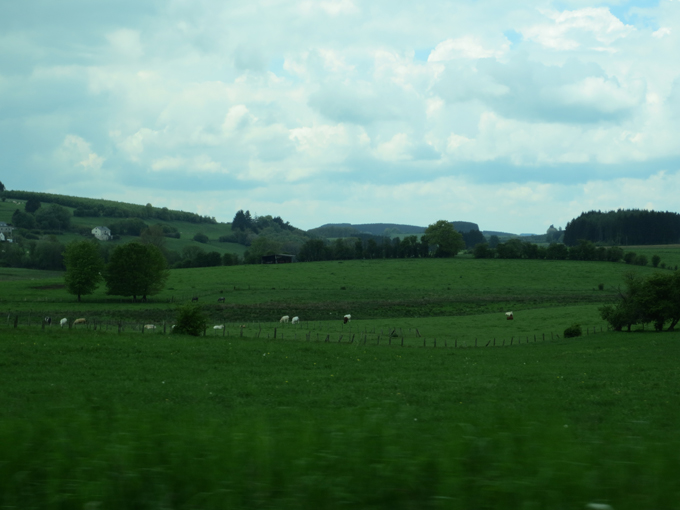 The Wallonia region accounts for 55% of Belgium’s territory but only one third of its population.
The Wallonia region accounts for 55% of Belgium’s territory but only one third of its population.
As the primary crop grown in the region, barley entered the daily lives of the residents as a food source. Farm owners brewed beer in the winter or early spring to be drunk in the summer months during crop planting, tending fields and harvesting crops. These beers became known as farmhouse ales. Seasonal workers (saisonner in French means seasonal) who tended the crops were provided low (or at least modest) alcohol beers made with natural yeast and lower quality local ingredients. Lower-alcohol beers prevented debilitating effects on the workers. In other words, farm owners used beer to help themselves and their seasonal farmhands to forget their hard day at work, but made certain the beer was not so strong as to get drunk and hungover.
Farmhouse ale does not mean a specific beer style. Rather the term refers to a broader category of beer styles originally made to support farm workers in southern Belgium as well as northern France. And Saison is one style of farmhouse ale that became very popular in the Wallonia region of Belgium.
Saison (French for season) is a pale ale that is highly carbonated, fruity, spicy, and often bottle conditioned. Historically brewed with low alcohol levels, modern productions of the style introduced moderate to high levels of alcohol.
Brief History of Brasserie Dupont – It all started because a Father did not want his beloved son to leave town.
A former farm in Tourpes (located in the Wallonia region), Brasserie Dupont dates back to 1759. In 1844, the farm became the Rimaux-Derrider farm-brewery. This brewery specialized in the production of honey and Saison beers.
Alfred Dupont bought the Rimaux-Derrider brewery in 1920 for his son, Louis Dupont. The gift kept Louis from moving to Canada to start a farm. Louis Dupont redesigned the basic “Saison” recipe to create Saison Dupont – a low alcohol beer (about 3%) at that time.
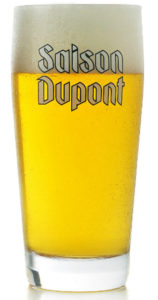 Saison Dupont – First introduced by Brasserie Dupont in 1920
Saison Dupont – First introduced by Brasserie Dupont in 1920
In 1942, Dupont’s nephew Sylva Rosier joined the brewery to manage operations. Sylva was a brewing engineer, educated in Ghent. Even though Sylva managed Brasserie Dupont, he primarily worked at the Zeeberg brewery in Aalst, East Flanders. At Zeeberg, Sylva became an expert in brewing lagers.
In 1945, Louis Dupont (who had no children) handed the Brasserie Dupont down to Sylva Rosier. However, Sylva faced a problem. After the Second World War, Pils beers became very popular. Many small Belgian breweries disappeared because they could not meet this demand. Sylva Rosier needed to act fast.
Quickly applying his technical brewing knowledge, Sylva introduced Redor Pils in 1950. His background and adaptability ensured the survival of the Brasserie Dupont. But Sylva never wavered in his support of the brewery’s original beers and maintaining the tradition of artisanal brewing.
Sylva, aided by his children, continued to make improvements and innovations. They modernized the brewery, added different beer styles and even pioneered the creation of organic beers. In the mid-1950’s, as stronger beers became more popular in Belgium, Sylva changed the recipe for Saison Dupont to create a higher alcohol saison.
In 1955, the brewery introduced Moinette Blonde, a Belgian strong pale ale. Ever since its creation, Moinette has reigned as Brasserie Dupont’s flagship beer in Belgium. So much so that in the 1980’s Saison Dupont dwindled to only 2 percent of Brasserie Dupont’s sales. Brasserie Dupont considered discontinuing Saison Dupont.
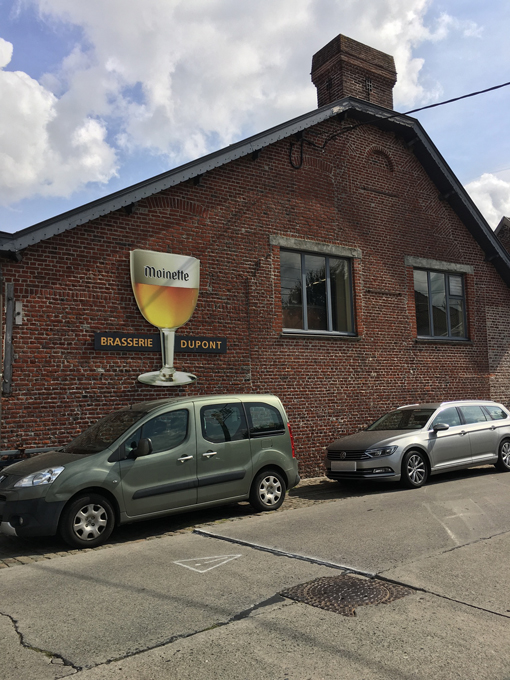 Moinette reigns as Brasserie Dupont’s flagship beer in Belgium – as reflected by this building’s signage.
Moinette reigns as Brasserie Dupont’s flagship beer in Belgium – as reflected by this building’s signage.
Enter a Few Saviors – Like a Phoenix, Saison Dupont Rises from the ashes!
Beer writer Michael Jackson came to love Saisons while traveling throughout Belgium in the 1970s. He called Saison Dupont “a down-to-earth classic of the style” and even named Brasserie Dupont as the classic producer of Saison in his book “Beer Companion – The World’s Great Beer Styles, Gastronomy and Traditions”.
In the 1980’s Jackson convinced the owners of beer import company Vanberg & DeWulf to create a partnership with Brasserie Dupont and begin importing Saison Dupont. Not long afterwards, Brasserie Dupont’s export business grew to 40 percent of their total production, with Saison Dupont leading sales in the United States.
And like a Phoenix, Saison Dupont rose from the ashes of its demise to become what is now considered an iconic beer and beer style. The Beer Connoisseur magazine describes Saison Dupont as“the benchmark by which all farmhouse ales are measured”.
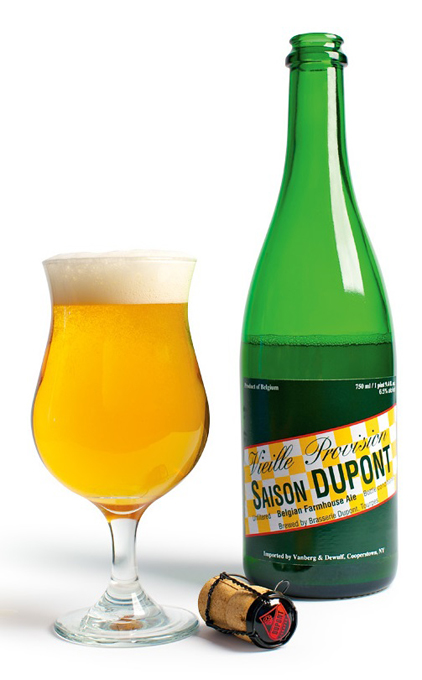 No other beer is considered more iconic of its beer style than Saison Dupont. Photograph courtesy of Brasserie Dupont.
No other beer is considered more iconic of its beer style than Saison Dupont. Photograph courtesy of Brasserie Dupont.
Visiting Brasserie Dupont – A step back in time.
Today, the Brasserie Dupont is owned by Sylva Rosier’s children and grandchildren. Sylva Rosier’s grandson, Olivier Dedeycker, joined the company in 1990 as a brewing engineer. In 2002, Olivier took the helm of the family brewery. He represents the fourth generation of this family of brewers.
Much of Brasserie Dupont is still housed in buildings that date back to its 1759 farm origins. In fact, the property maintains the general farm atmosphere. Moreover, a remarkable silence surrounds the brewery. But make no mistake, the brewery and production line are primarily composed of modern equipment.
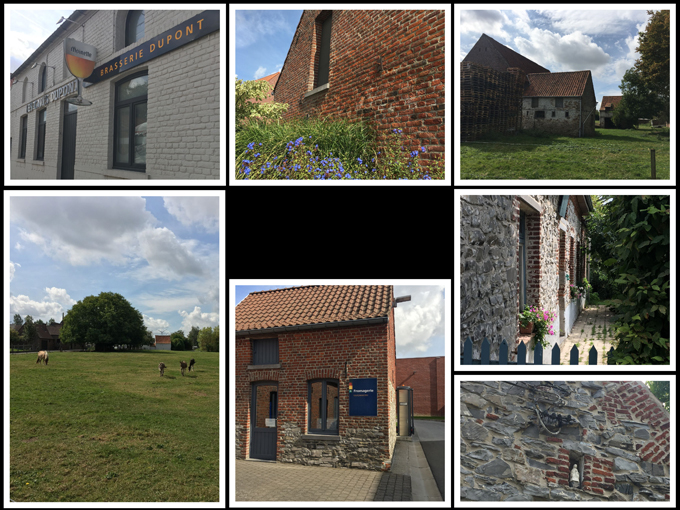 Stepping back in time to 1759 – almost
Stepping back in time to 1759 – almost
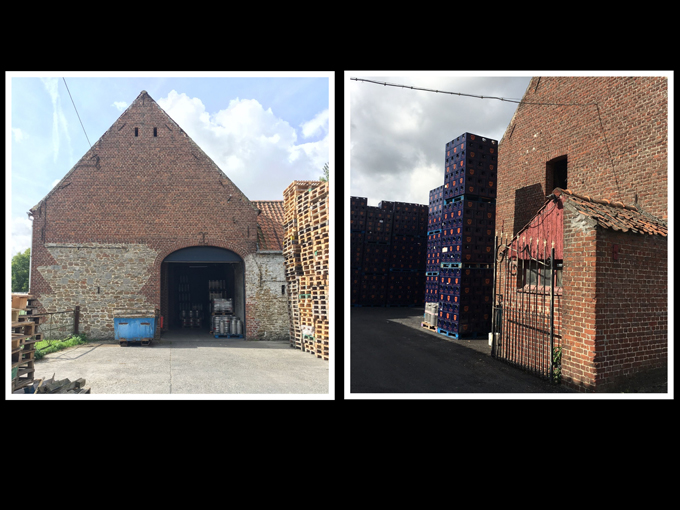 But modern components intrude on the mirage.
But modern components intrude on the mirage.
As you park your car, burros come to greet you.
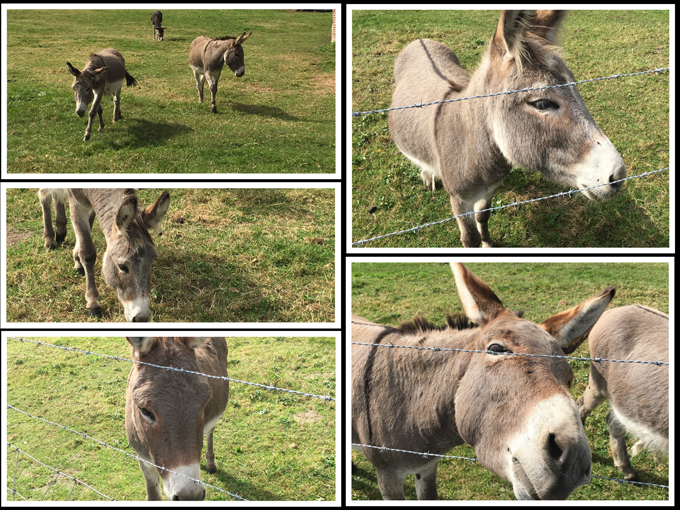 Got treats?
Got treats?
The main street, Rue de la Brasserie, once served as the main road through the village. Today the road only services brewery work vehicles and tourists. Be certain to walk around the grounds and soak in the atmosphere.
 A side street offers potential for a new adventure.
A side street offers potential for a new adventure.
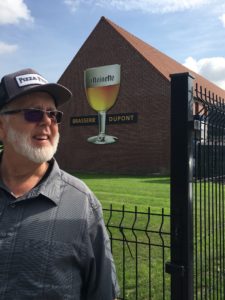 Thrilled to visit Brasserie Dupont!
Thrilled to visit Brasserie Dupont!
 Watch out for the trucks and forklifts!
Watch out for the trucks and forklifts!
Brewery tours are available. Sign up online for a tour.
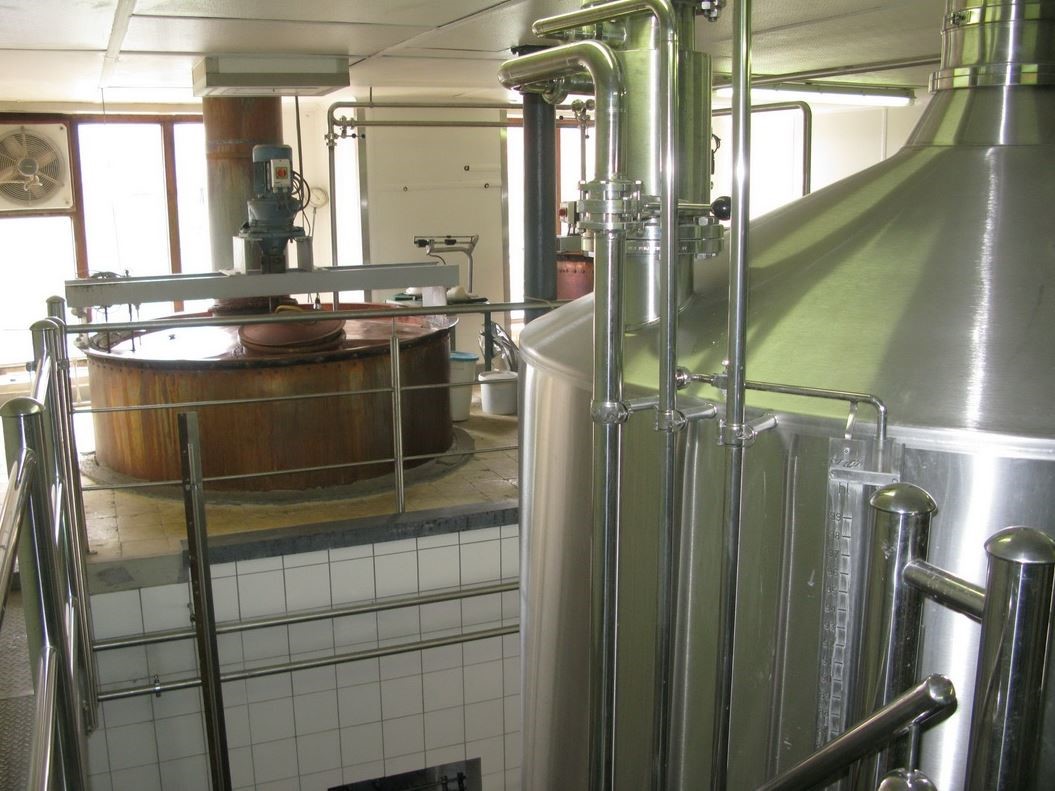 Brewery photograph courtesy of Brasserie Dupont.
Brewery photograph courtesy of Brasserie Dupont.
The Dupont brewery also has its own cheese dairy.
 Fromagerie this way to the left.
Fromagerie this way to the left.
A visit to the brewery gift store offers opportunities to buy beer, cheese, and other mementos. The gift store staff were some of the friendliest people we’ve ever met.
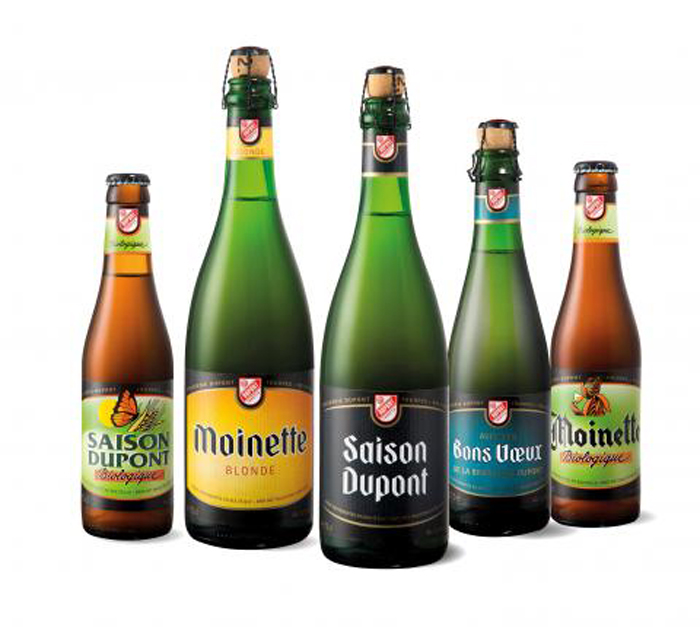
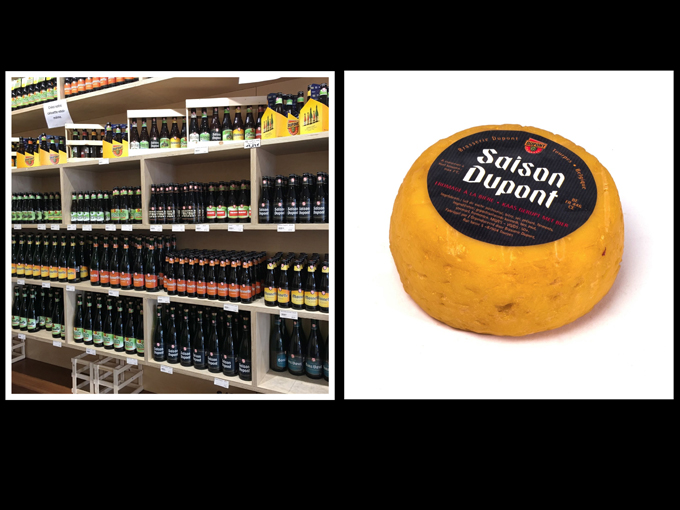
I’ve never been greeted by burros before. I knew I was in for a treat at DuPont!